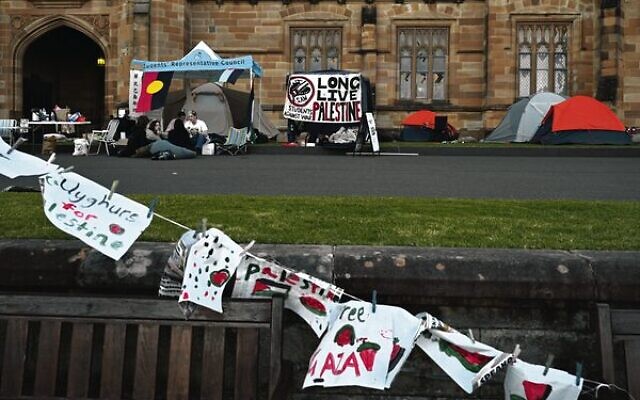USYD head stands firm as other unis act
"How many times do they need to show us who they are before people in positions of leadership take them at their word?" asked Executive Council of Australian Jewry co-CEO Alex Ryvchin.

University of Sydney (USYD) vice-chancellor Mark Scott is “effectively giving licence to bullying, harassment and hate speech”, Australia/Israel & Jewish Affairs Council executive director Colin Rubenstein said this week.
It comes after ostensibly pro-Palestinian encampments at the Australian National University and Deakin University were given their dismantling orders last week and protesters occupying a building at Melbourne University were told to evacuate or risk being expelled.
But again citing free speech, Scott on Monday defended the right of the encampments to remain on his campus, comparing them to demonstrations against the Vietnam war to 2GB’s Ben Fordham, while again insisting the phrase “from the river to the sea” and calls of “intifada” were not hate speech.
USYD has been an epicentre of antisemitic activity since October 7, with many students and staff fearing for their safety on campus, while Scott has been accused of showing a lack of leadership over the issue.
On Tuesday, StandWithUs executive director Michael Gencher and former British soldier Colonel Richard Kemp attempted to peacefully engage in discussion with protesters on the campus, but were moved on by security.
Earlier this month, respected professor Peter Morgan had his lecture interrupted by protesters who intimidated students and refused to leave, the second incident of that week, according to The Australian.
Writing in that masthead, Scott said this week, “If an investigation currently underway proves these protesters have crossed the line from peaceful protest to unacceptable conduct, disciplinary action will be taken.” But he said, “I completely reject any suggestion the university – or … I in particular – have fostered an unsafe environment for Jewish students and staff.”
Rubenstein said Australian Jewish students would be “profoundly disappointed and dismayed” at Scott’s stance prioritising “an abstract model of ‘free speech’ over human safety”.
“Worse, his insistence that nothing can be done about the open incitement to violence and genocide represented by slogans like ‘from the river to the sea, Palestine will be free’ or calls to ‘globalise the intifada’ – an implied call for violence in Australian cities – effectively means that the university’s anti-racism policies are meaningless, empty words,” he said.
Executive Council of Australian Jewry co-CEO Alex Ryvchin said it was “extremely disappointing” to hear the protesters compared with human rights activists of prior eras.
“How many times do they need to show us who they are before people in positions of leadership take them at their word?” he asked. “Hearing [Scott] speak about negotiating with these people while Jewish students and activists stay off campus is pitiful.
“Our universities are descending into a state of disarray. This has gone too far. The universities have codes of conduct and the police have powers. It is time to use them.”
The ECAJ also endorsed a call by Coalition and crossbench senators for a judicial inquiry into antisemitism on campus. The senators wrote to Prime Minister Anthony Albanese last week calling for the government to adopt a zero-tolerance approach to antisemitism.
“The failure of many university leaders to combat the alarming rise in antisemitism on campus, including encampments and other protest activity which are fuelling unprecedented levels of antisemitic hate and incitement, demands immediate and serious action,” Shadow Education Minister Sarah Henderson said.
ECAJ co-CEO Peter Wertheim said, “We would strongly oppose any attempt to water down the scope of that inquiry by taking its primary focus away from antisemitism. Whilst all racism is a problem, the explosion of antisemitism on campuses in Australia and overseas has no parallel or comparison.”
Zionist Federation of Australia director of public affairs Bren Carlill said, “The situation is urgent and serious, and it is well past time for action.”
Albanese announced a broader probe into racism on campus during last week’s budget.

comments